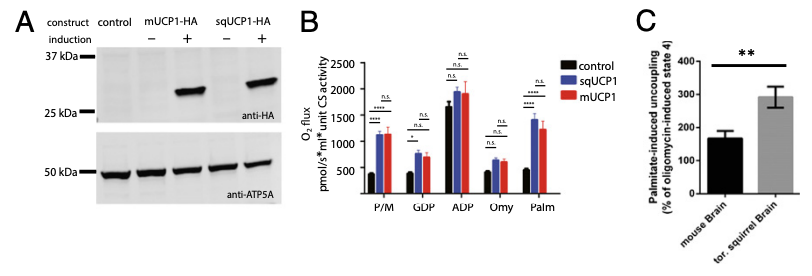Hibernating Squirrel Paper Questions
1/9
There's no tags or description
Looks like no tags are added yet.
Name | Mastery | Learn | Test | Matching | Spaced |
|---|
No study sessions yet.
10 Terms
What does euthermic mean?
Returning to normal body temperature
What is the role of proton gradient in ATP production?
The proton gradient is used to make energy via the enzyme ATP synthase. The proton gradient is created by the complexes that pump protons into the intermembrane space
How does UCP1 cause more heat to be produced by aerobic respiration?
UCP1 uses up some of the protons that would be used to make ATP and instead creates heat through the dissipated proton motive energy
What size of mammals are the ones that really benefit from hibernating?
Smaller mammals since their weight-specific metabolic rates are extremely high when compared to larger sized mammals, so the difference between their hibernating and non-hibernating metabolic rates is much more significant.
What are some possible reasons that hibernation is interrupted by periods of arousal?
Eliminating waste, maintaining immune system function, maintaining nervous system function (make sure synapses don’t die).
Why were mice used as a control in the research paper?
Because mice only have UCP1 expression in the brown adipose tissue and not in the cortex
What was the conclusion the paper had on UCP1 expression in squirrels vs. mice?
Torpid Squirrels and Mice both have UCP1 expression in the mitochondria. However torpid squirrels have a higher ratio of UCP1/COXIV than active squirrels

What does this figure show?
UCP1 uncouples oxidative phosphorylation in both mice and squirrels. Part B shows that oxygen is still being consumed even when not making ATP, so it has to be used for heat. Part C shows that torpid squirrels were better at this than mice.

What does this figure show?
During torpor, the head of the squirrels are elevated when compared to the rest of the body, this could be due to increased UCP1 activity.
How do extra ocular muscles in sharks and billfish create heat?
The extra muscles create more heat since these muscles leak out calcium, and energy needs to be used to pump calcium back into the SR, creating heat.